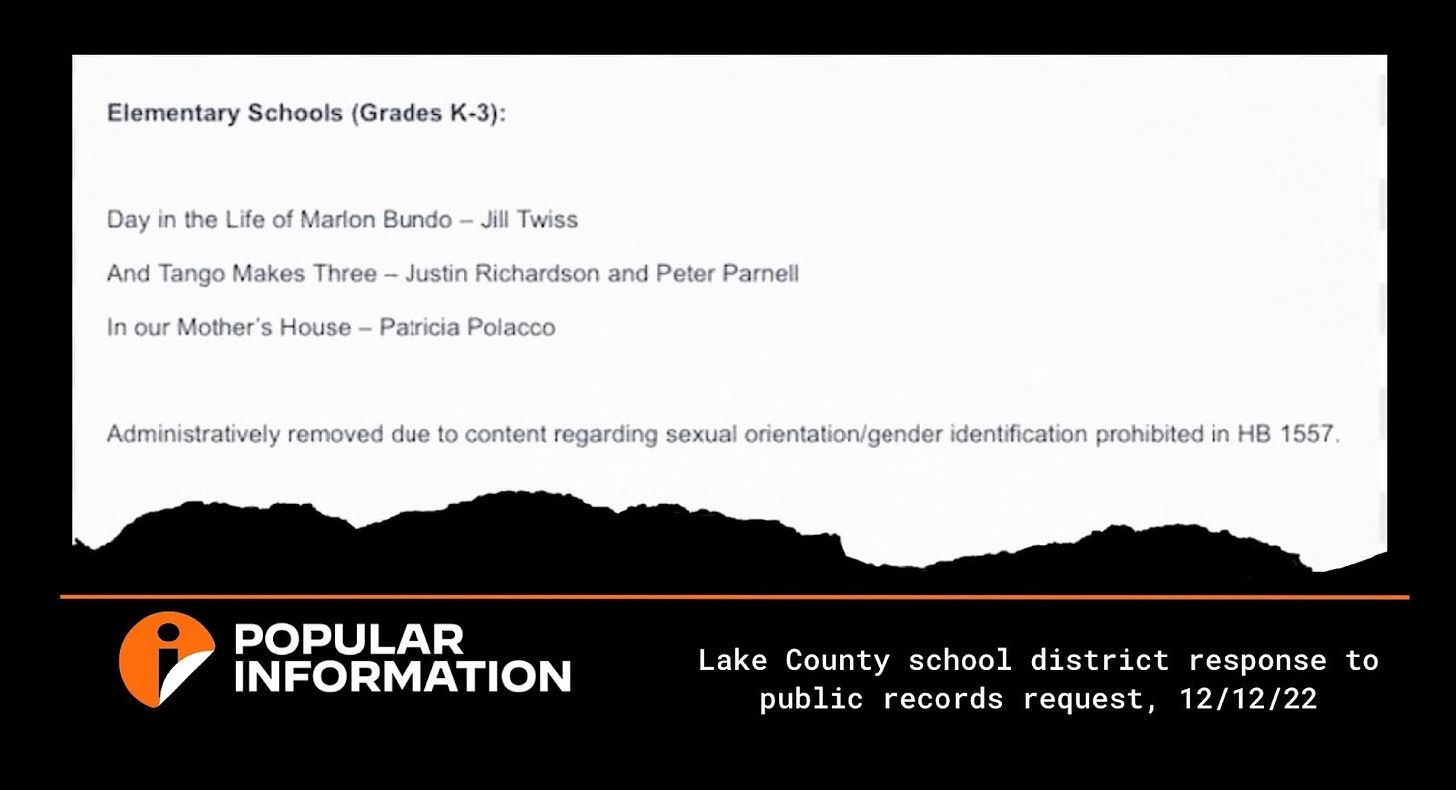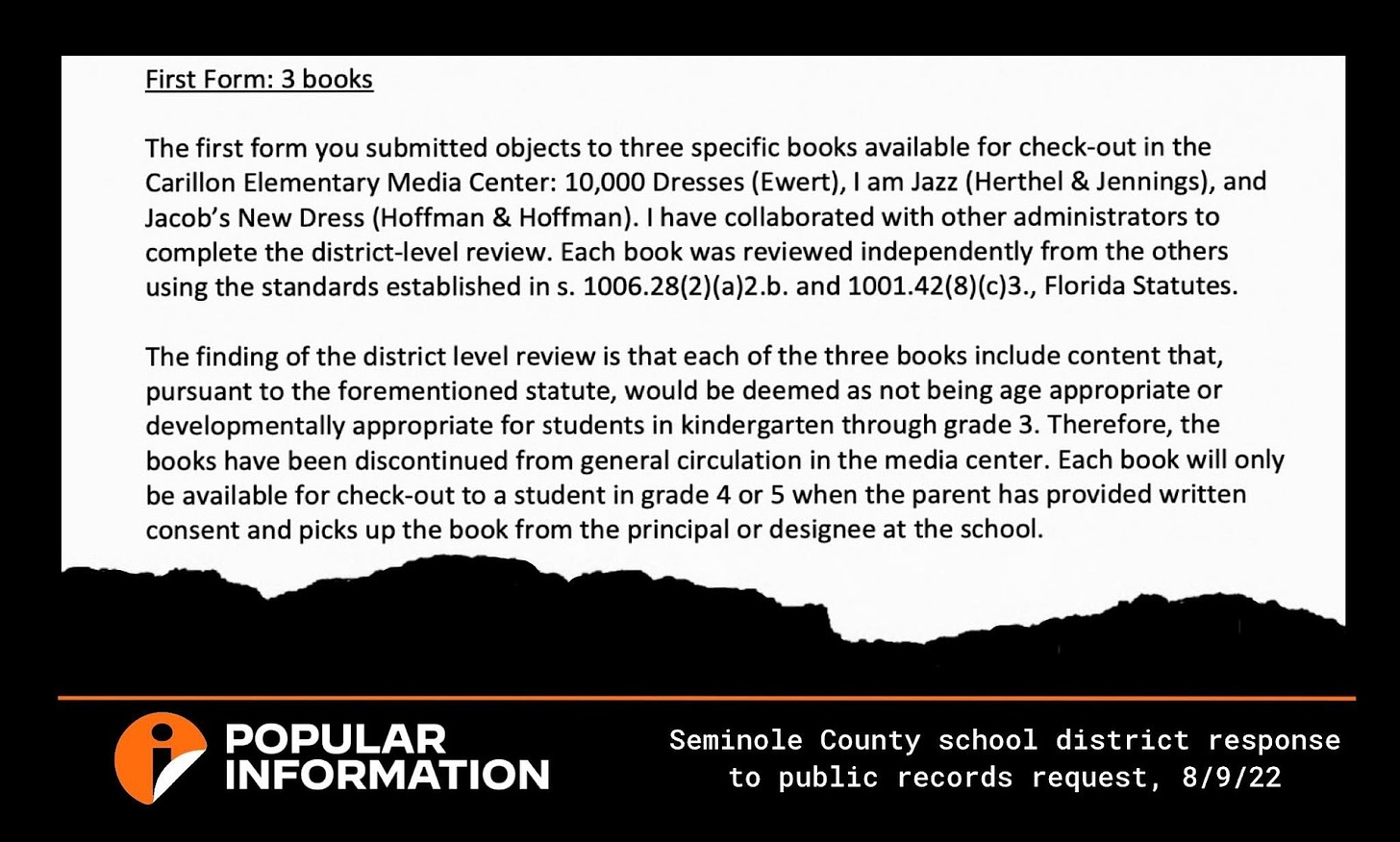In March 2022, Florida Governor Ron DeSantis (R) signed into law the Parental Rights in Education Act, which critics dubbed the “Don’t Say Gay” bill. DeSantis angrily accused the media of promoting a “false narrative,” insisting the bill does not prohibit mentioning LGBTQ people in Florida schools.
According to DeSantis, the scope of the bill is limited and only prohibits “sexual instruction” directed at young students. “When you actually look at the bill and it says ‘no sexual instruction to kids pre-K through three,’ how many parents want their kids to have transgenderism or something injected into classroom instruction?” DeSantis said. “It’s basically saying for our younger students, do you really want them being taught about sex? And this is any sexual stuff.”
The relevant portion of the law reads as follows:
Classroom instruction by school personnel or third parties on sexual orientation or gender identity may not occur in kindergarten through grade 3 or in a manner that is not age appropriate or developmentally appropriate for students in accordance with state standards.
Conservative media outlets echoed DeSantis’ argument. The Wall Street Journal editorial board, for example, argued the law would have “no immediate effect” because “sexual orientation and gender identity is not something that is being taught in grades K-3.” The editorial board said the bill was limited to “classroom instruction.”
But despite these protestations, Florida schools are using the law to justify the erasure of LGBTQ people. Public records obtained by Popular Information through the Florida Freedom to Read Project reveal that several Florida schools have already removed books with LGBTQ characters from their libraries, citing the Parental Rights in Education Act. Further, training materials produced by the Florida Department of Education for librarians reveal that the DeSantis administration is encouraging this expansive interpretation of the law.
In Lake County, for example, the school district has removed three books with LGBTQ themes from libraries. The school district claimed the removal of these books was required “due to content regarding sexual orientation/gender identification prohibited in HB 1557,” the Parental Rights in Education Act.
These books do not involve “sexual instruction.” One book that was removed, And Tango Makes Three, is the true story of two male Penguins, Roy and Silo, who lived in the Central Park Zoo. The pair build a nest together, and — after the zookeeper provides them with an egg — they raise an adopted child, Tango. There is no sexual content in the book.
In Seminole County, the school district has also pulled three books with LGBTQ themes from circulation, citing the Parental Rights in Education Act (1001.42(8)(c)3 in Florida Statutes). The books will now only be available only to 4th and 5th graders if a parent explicitly grants permission and picks the book up from the principal.
The books pulled from the shelves in Seminole County include gender-nonconforming characters, but have nothing to do with sex. Jacob’s New Dress, for example, is about a little boy that likes to wear dresses. Officials in Manatee County have also removed several books with LGBTQ characters from the shelves based on the Parental Rights in Education Act.
After the Parental Rights in Education Act was signed into a law, a group of LGBTQ students and their parents filed a lawsuit in federal court. The complaint alleges that the law violated “the First and Fourteenth Amendments to the United States Constitution.” The plaintiffs allege “they have been subjected to a discriminatory educational environment that treats LGBTQ people and issues as something to be shunned and avoided, on pain of discipline and liability.”
To support their argument, the plaintiffs cite the 1982 Supreme Court case of Board of Education v. Pico. In Pico, the court ruled that the First Amendment protects students’ “right to receive information and ideas.” The plaintiffs state that the new law violates the standard established in Pico because the restrictions are not “reasonably related to legitimate pedagogical concerns.”
In a motion to dismiss the case, lawyers representing DeSantis and the State of Florida argue that Pico does not apply. DeSantis’ lawyers state that Pico applies to the availability of library books while the Parental Rights in Education Act applies only to classroom instruction.
Plaintiffs point to Board of Education vs. Pico for the plurality’s statement that the State’s discretion to select school library books may not be exercised “in a narrowly partisan or political manner.” …Plaintiffs …overread Pico on its own terms. The plurality was clear that classroom instruction is different, expressing “full agreement” that States “must be permitted to establish and apply their curriculum in such a way as to transmit community values, and that there is a legitimate and substantial community interest in promoting respect for …traditional values be they social, moral, or political.”
While this is what DeSantis’ lawyers are telling a federal judge, school librarians are receiving a different message.
The Florida Department of Education is currently in the process of developing a training for school librarians regarding the selection of library materials. Notably, the training does not inform librarians that the Parental Rights in Education Act does not apply to library books. Rather, librarians are told: “There is some overlap between the selection criteria for instructional and library materials.”
The slide that follows says that library books and instructional materials cannot include “unsolicited theories that may lead to student indoctrination.”
A subsequent slide provides a list of “unsolicited theories that may lead to student indoctrination.” That list, citing the Parental Rights in Education Act, states that information about “sexual orientation or gender identity” is prohibited for K-3 students. The training seeks to encourage librarians to remove books with LGBTQ themes from elementary school libraries by conflating the standards for instructional materials and library books.
To encourage the removal of more books, the training instructs librarians to “err on the side of caution” and consider “whether you as an adult would be comfortable reading the material in person in a public meeting.” The “read aloud” standard has no basis in Florida or federal law but is being pushed aggressively by right-wing organizations like Moms For Liberty. Members of Moms For Liberty regularly attend school meetings and read passages aloud as “proof” they are inappropriate for students.
Florida is accepting public comment regarding the draft training until January 18, 2023.












